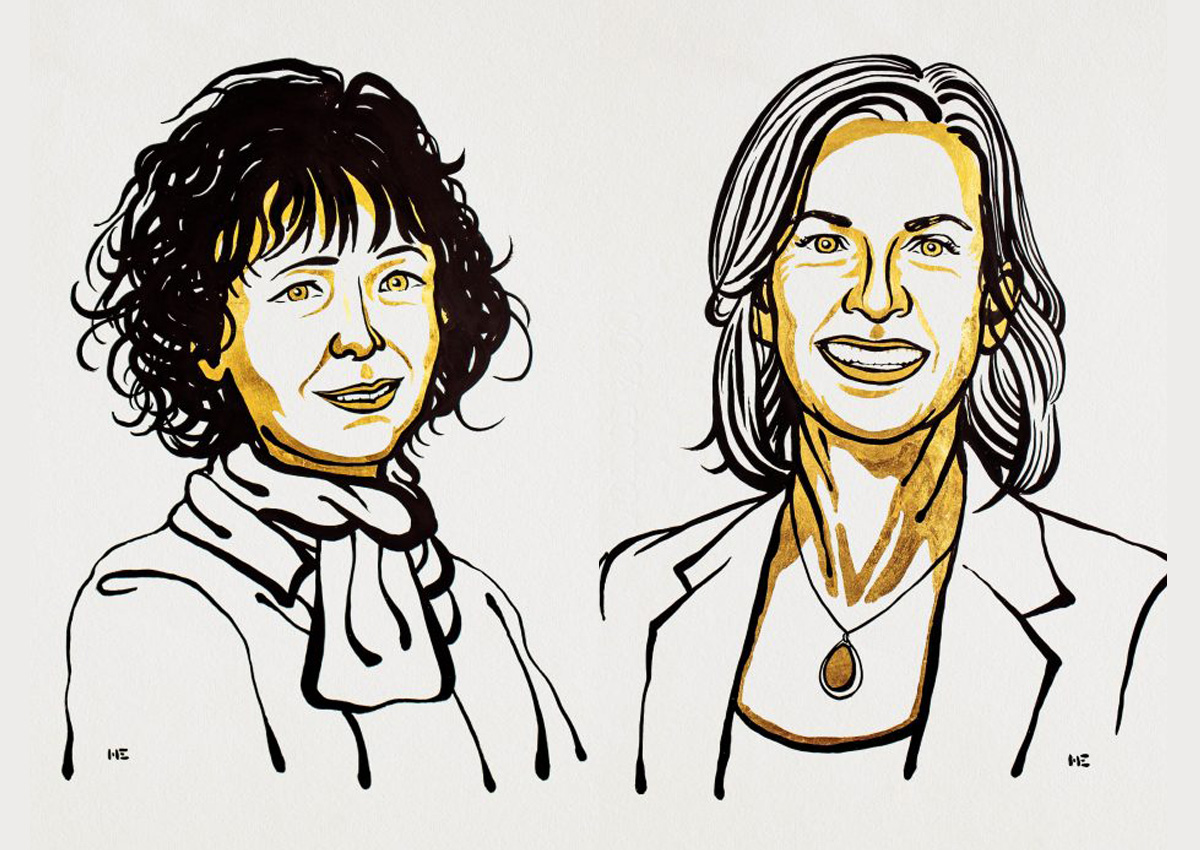
Emmanuelle Charpentier and Jennifer A. Doudna Awarded 2020 Nobel Prize in Chemistry
October 14, 2020| |
On October 7, 2020, The Royal Swedish Academy of Sciences awarded the Nobel Prize in Chemistry jointly to Emmanuelle Charpentier of the Max Planck Unit for the Science of Pathogens and Jennifer A. Doudna of the University of California, Berkeley for the development of a method for genome editing. This method, the CRISPR-Cas9 genetic scissors, is one of gene technology's sharpest tools.
Modifying genes in cells used to be time-consuming, difficult, and sometimes impossible work. CRISPR-Cas9 has made it possible to change the code of life over the course of a few weeks. Claes Gustafsson, chair of the Nobel Committee for Chemistry said, "There is enormous power in this genetic tool, which affects us all. It has not only revolutionized basic science, but also resulted in innovative crops and will lead to ground-breaking new medical treatments."
CRISPR-Cas9's discovery was unexpected. Emmanuelle Charpentier's studies of Streptococcus pyogenes, one of the bacteria that cause the most harm to humanity, led her discovery of a previously unknown molecule, tracrRNA. Her work showed that tracrRNA is part of bacteria's ancient immune system, CRISPR-Cas, that disarms viruses by cleaving their DNA. Charpentier published her discovery in 2011 and initiated a collaboration with Jennifer Doudna, an experienced biochemist with vast knowledge of RNA. Together, they succeeded in recreating the bacteria's genetic scissors in a test tube and simplifying the scissors' molecular components so they were easier to use.
Since Charpentier and Doudna discovered the CRISPR-Cas9 genetic scissors in 2012 their use has exploded. This tool has contributed to many important discoveries in basic research, and plant researchers have been able to develop crops that withstand mold, pests, and drought. In medicine, clinical trials of new cancer therapies are underway, and the dream of being able to cure inherited diseases is about to come true. These genetic scissors have taken the life sciences into a new epoch and, in many ways, are bringing the greatest benefit to humankind.
For more details, read the press release of the announcement on The Nobel Prize website.
| |
You might also like:
- Rise of the First Gene-edited Soybean Welcomes New CRISPR Foods
- CRISPR-Cas9 for Drug Addiction Treatment
- CRISPR Technique 90% Effective in Reducing SARS-CoV-2 Coronavirus
- Scientists Use CRISPR to Develop Apples Resistant to Fire Blight
- Pocket K No. 54: Plant Breeding Innovation: CRISPR-Cas9
Biotech Updates is a weekly newsletter of ISAAA, a not-for-profit organization. It is distributed for free to over 22,000 subscribers worldwide to inform them about the key developments in biosciences, especially in biotechnology. Your support will help us in our mission to feed the world with knowledge. You can help by donating as little as $10.
-
See more articles:
-
News from Around the World
- ISAAA Webinars Tackle Global Animal Biotech Regulations
- Biotech Experts to Discuss Impact of GM Crops in India
- Argentina First in the World to Approve Drought Tolerant HB4® Wheat
- Bt Cotton Adoption in India Impacts Yields, Profits, and Living Standards
- International Experts Discuss Animal Biotech with Philippine Stakeholders
- Plant-based Milk Bottles Launched in New Zealand
- EU Approves XtendFlex Soybeans for Food and Feed Use
-
Research Highlights
- Experts Find Genes Linked to Nitrogen Metabolism
-
Plant
- Genome Editing of Wheat Alters Spike and Grain Characteristrics
- Emmanuelle Charpentier and Jennifer A. Doudna Awarded 2020 Nobel Prize in Chemistry
-
Health
- NAS Releases Guidance on Reopening K-12 Schools During the COVID-19 Pandemic
- Study Reveals Most Countries Fail to Protect Nature in COVID-19 Recovery Plans
-
Read the latest: - Biotech Updates (December 17, 2025)
- Gene Editing Supplement (December 17, 2025)
- Gene Drive Supplement (February 22, 2023)
-
Subscribe to BU: - Share
- Tweet

